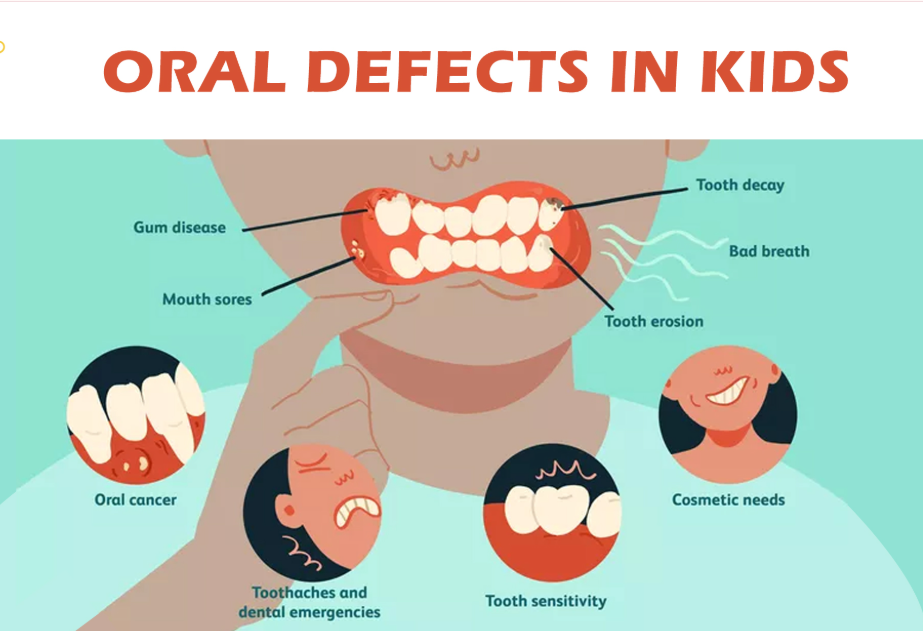Good dental care in childhood is essential because the jaw needs to develop correctly and the bite needs to be aligned. The failure to address this fundamental concern is likely to yield a range of orthodontic problems that may require time-consuming treatment in the future at a considerably higher cost. Good pediatric dentistry can help prevent such issues and ensure that a child’s smile develops properly.
Check out here how neglecting oral hygiene may affect your child’s dental position and jaw structure, and what you can do as parents to safeguard their little one’s oral health.

The Importance of Early Oral Hygiene
A child’s teeth and jaw are still developing, which means they are even more susceptible to decay, gum disease, and misalignment issues. Although permanent teeth will eventually replace your child’s primary teeth, they are necessary for future development and will help prevent your child from needing unnecessary orthodontic treatment.
If brushing, flossing, and dentist visits are ignored, the damage can be more than just cavities, culminating in the need for orthodontic work, such as braces or surgery.
Typical Orthodontic Problems Associated with Poor Oral Hygiene
Caries and Premature Loss of Teeth
Tooth Decay is one of the most direct results of bad dental habits. Cavities make teeth structurally unsound and can progress to the point where you lose them prematurely. Decay can cause baby teeth to be lost too early, and the teeth beside them can drift into the space. It stops the growth of a permanent tooth and sometimes leads to the permanent teeth coming in crowded or crooked.
The alignment issues are some of the most common reasons children have to get braces or other orthodontic treatments.
Periodontitis and Tooth Loss
Young children can even develop gum disease, which is caused by plaque and bacteria adhering to the gumline. Swollen gums weaken the tissues and bone structures that hold teeth in place, which also makes you more prone to tooth mobility and bite problems. Malocclusions (bad bites), such as overbite, underbite, and crossbite, usually proceed.
Your gums are every bit as important as your teeth, and especially when your teeth and jaw are still forming, gum health is essential.

Jaw Development Issues
But poor oral hygiene does not work alone — it often buddies up to bad oral habits, such as long-term pacifier use, thumb sucking or mouth breathing. These with gum inflammation or infection can interfere with jaw development and relationship. As a result, they may even develop bite problems, such as an open bite or underbite, that may need to be surgically corrected later in adolescence or adulthood.
Crowding and Misalignment
Unattended decay and gum problems cause an unstable mouth environment. Once teeth begin to migrate because of their eroded support structures, they may even overlap or rotate, creating crowding. Overcrowded teeth can be challenging to clean and, in turn, lead to more decay, which can spiral out of control if not addressed.
Alignment issues not only affect the appearance of your smile but also how your mouth functions and how well you keep it clean.
Impaired Speech and Chewing
Problematic Speech and Eating: Children’s misaligned teeth and mismatched bites can make it more difficult for them to speak and chew. These actions are crucial in early life for learning and feeding. When a child finds it difficult to chew food and speak, not only do you affect their confidence, but you may also affect their development.
Closing off these spaces later can be slow and time-consuming, even after a set of braces.
Pediatric Dental Care Tips For Your Child’s Prevention
Start Dental Visits Early
Please make an appointment for your child to visit the dentist by the time of their first birthday. These early visits help a pediatric dentist near me track oral development and identify issues early on that could become significant problems.
Oversee Brushing and Flossing
Your child will need help to brush and floss effectively until at least 7 or 8. Make it a habit to do it twice a day. Brush teeth with fluoride toothpaste and start flossing as soon as two teeth touch.
Manage Diet and Habits
Avoid sugary snacks and drinks, particularly sticky foods that can stick to your teeth. Rinse with water after meals. Discourage harmful oral habits like thumb sucking or the use of a pacifier after 2 or 3 years.
Maintain Regular Checkups
Regular visits to a pediatric dentist near me every six months enable us to identify early signs of decay, gum disease, or alignment problems. Dentists can also provide preventive treatments, such as fluoride applications and sealants.
FAQs – Pediatric Dental and Orthodontic Issues
What is an appropriate age for my child to see a pediatric dentist?
The American Academy of Pediatric Dentistry suggests that the inaugural visit take place by the child’s first birthday or within six months from the time the first tooth erupts. Early visits to the dentist will set your child up for a lifetime of good habits.
Do baby teeth matter when it comes to the alignment of permanent teeth?
Yes. Deciduous teeth act as placeholders for the adult teeth to follow. Failure by them to fall out early due to decay or gum disease can cause problems for permanent teeth that grow out of position or become impacted.
How does a paediatric dentist contribute to the prevention of orthodontic problems?
Pediatric dental practitioners supervise oral growth and development, providing preventive and interceptive oral health care. They also teach parents proper oral hygiene at home.
When is a good age to start flossing my child’s teeth?
Start flossing when any two of his teeth are close enough to touch. This eliminates the plaque between teeth where toothbrushes can’t reach and helps prevent gum disease.
A Healthy Smile Begins with Little Ones
Poor oral hygiene in childhood can cause orthodontic problems, which years of braces and significant money can only fix. Taking care of your child’s smile early also ensures good tooth eruption, jaw growth, and development, and function—stopping a multitude of problems before they even start.
Once they are comfortable, take them to a trusted local pediatric dentist and remain consistent from that point on.









